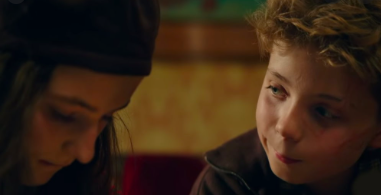WHAT IS IT ABOUT JOJO RABBIT THAT HAS CREATED A DIVIDE BETWEEN CRITICS AND AUDIENCE?
- Utkarsha Kotian
- Feb 10, 2020
- 3 min read
By Sarah Zia
A film by Taika Waititi based on the journey of a blossoming friendship between sworn enemies by birth in the form of young kids, Jojo Rabbit may appear to be a satirical jab at the Third Reich, but it does, in fact, stand on the remains of the holocaust—a tragedy. The film does well to shield most of the really disturbing aspects of the holocaust, only exposing the audience to them to evoke the most heartfelt of emotions, eg. scenes surrounding the street executions. Other than that, it steers clear of the dark matter, focusing instead on the main subject of its plot—Jojo Betzler, a young member of the Hitler Youth, who is blinded by his fanaticism for the tyrannical leader and the Nazi ideology.

The film unravels as Jojo—who comes from a broken family with his sister dead and his father lost in war—discovers a jewish girl, Elsa, in his attic, to be hidden from the cruelties of the holocaust by Jojo’s very own mother, Rosie. An unlikely friendship is forged between the two, which draws a lot of parallels to the friendship between John Boyle’s characters, Bruno and Shmuel from the film, The Boy in the Striped Pyjamas (TBITSP).
A very common reason that such conflicts are repeatedly viewed from the perspectives of children, is because it’s comparatively simpler for them to act on their impulses and unlearn old ideologies when they learn the new truths of life. In TBITSP, Bruno, the son of a Nazi, is comically oblivious to his father’s actions and the plight of his country. Jojo on the other hand, is a victim to the atrocious Nazi propaganda and has been blinded with animosity towards the Jews. Both protagonists in their respective stories are more or less the same age and both befriend Jews, but where one is blind to and sheltered from the transgressions taking place around him, the other is aware, but just enough to seek solace on the wrong side.

In Jojo Rabbit, Jojo’s own constant battle with his conscience is portrayed in the form of an imaginary friend—the Führer himself, who slowly transforms from a playful, innocent friend to the true megalomanic persona of the real tyrant. This transition is nothing but a metaphor - Jojo discovering the baselessness of his life-long beliefs and fighting to get rid of them as he starts getting attached to his hidden Jewish friend.
While TBITSP focuses on eliciting empathy from the audiences by sacrificing its protagonists to show the detrimental aspects of genocidal propaganda, thereby appealing to emotions of loss and grief, Jojo Rabbit tries to garner the same through comedy and light-hearted emotion, ending on a more positive note. Jojo emerges successful in freeing himself from the clutches of the evil Nazi beliefs when he kicks his imaginary führer friend out the window and resolves his inner-conflicts at that tender age.
The reason the film has caused a great divide in its reactions, with favours falling on extreme ends of the spectrum, and pushed many critics as a feeble attempt at portraying the true horrors of the holocaust is because (in my extremely humble opinion), they were all grappling for realism. While Jojo in no way, trivialises the holocaust, it also barely touches upon the real darkness the concept is surrounded with. The way I see it, this maintains the child-like innocence of the plot whilst also tugging at the emotions of the audience, and opens their eyes to the harsh misdoings that are brought about by propaganda. The incompetent nature of all the Nazis actually shown in the film contributes further to that very notion. Thus, the emotions evoked throughout the film were perfectly balanced and executed in just the right way, to ensure the absence of that realism went unnoticed.
.png)









Comments